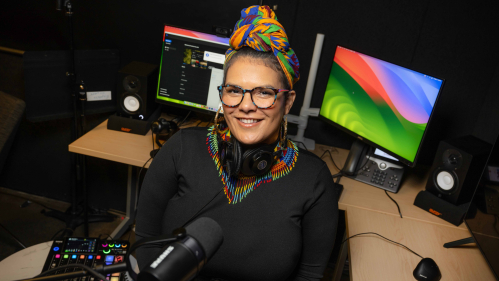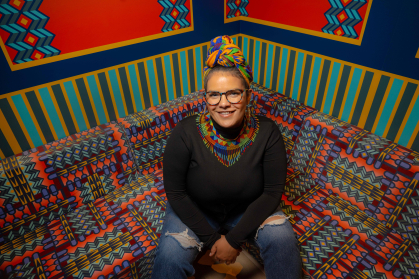Professor’s New Web Series Celebrates AfroLatine Culture

The Azucar TV series, hosted on YouTube by social work professor Natalie Muñoz, highlights the beauty and richness of AfroLatine culture, history and healing traditions
Grandaughter to Dominican and Cuban immigrants, Natalie Muñoz spent most of her childhood in Elmhurst, Queens growing up in a cultural melting pot of foods, hair textures, fashion styles and music.
“Having so much access to so much diversity really shaped who I am today, because I was able to engage with cultures from all over the world as well as cuisines from all over the world at a very young age,” said the Rutgers University-Newark professor of social work.
Muñoz’s immersion in the many subcultures of the Black and Latine communities served as the perfect springboard not only for her doctoral studies centered on how Historically Black Colleges and Universities shaped AfroLatine college student identity development and mental health but also for the YouTube series, “Azucar TV,” inspired by those studies.
The series, which launched earlier this year, emphasizes unity and the interconnected struggles for liberation within Black and Brown communities through interviews with prominent AfroLatine figures.
“AfroLatine Scholars have always discussed the concept of triple consciousness, which is the idea that you're never going to be Black enough, especially if you speak Spanish, Portuguese or French. As an AfroLatine, you're also never going to be Latine enough, especially if you are dark skin or if you're born in the United States, right? And then being born in the United States, you're also dealing with systematic oppression and this feeling of never being American enough, either,” Muñoz says.
The show was named after a song by legendary AfroCuban salsa singer Celia Cruz.
“It’s named after the song “Azucar,” which means sugar. Sugar is sweet, however it is also an ode to the fact that our ancestors harvested sugar and sacrificed for our liberation, so it’s that bitter sweetness,” Munoz states.
I feel like she was an AfroLatina Cuban artist who brought joy back to Blackness in such a contentious time. I think that's exactly what Azucar TV is trying to do. Educate to empower, but also to provide a sense of joy and solidarity,” Muñoz continues.
The show’s first season includes interviews with Harlem-based public scholar and curator Margarita Lila Rosa and Juan Cartagena and Nanette Hernández, founders of Segunda Quimbamba, a Jersey City based cultural arts organization that celebrates Puerto Rican folkorlic dance and percussion.
“As a professor, it’s like you're planting seeds and not knowing where they're going to bloom or when they're going to bloom. You can't always see the impact in your writing,” Muñoz explains. “That's why I wanted to create this outlet. I want to make research more accessible. There’s so many amazing AfroLatine, African American, African and Caribbean scholars who are doing so much amazing research, but I feel like it's just not as accessible to the community. This is for people who may not have access to higher education but are interested and curious and want to further develop their ethnic racial identity or just really understand their history more.”

The show is the latest project in a career that has been dedicated to fostering inclusivity and advancing the graduation rates and success of underserved students in higher education. She came to Rutgers-Newark in 2023 because of the school’s reputation for providing a ladder for social economic mobility for diverse college students.
“Rutgers-Newark was an intentional choice for me because it's in a Black urban neighborhood, it’s a state school and it’s a designated Hispanic-Serving Institution. Plus, there is a large population of AfroLatines in the Northeast which feels perfectly suited for my research and life mission to empower diverse students thus far,” Muñoz explains.
“As a social worker, a lot of times healing is looked at through a Eurocentric lens and because of colonization and anti-Blackness, a lot of Afro and Indigenous cultural traditions have been erased,” Munoz elaborates. “I want to make sure that people know that there are still people practicing these Black-rooted spiritual practices, healing and other forms of modalities. Healing doesn't have to just be this Eurocentric idea of talk therapy, it can incorporate cultural dance and movement, too.”
She completed her undergraduate and master’s degrees in psychology and social work at Stony Brook, and her doctorate in social work at Howard University.
“I was looking for a safe haven, an opportunity to explore racial trauma and understand identity development. I didn't know exactly what I was going to do going in, but I just knew I wanted to really understand ethnic racial identity development,” Muñoz says.
Once she discovered there was an abundance of research on the positive experiences of ethnic/racial identity development on African Americans at HBCUs but little on the experiences of AfroLatines, Caribbeans or Africans, Muñoz realized where she could contribute to the communities she cherished most.
“I really wanted to understand the way in which HBCUs empower Black identity development for AfroLatine and Caribbean students. Through my research, I found that AfroLatine college students attending HBCU felt empowered to embrace their Black identity unapologetically. Even though many of them had no access to their histories prior to attending their HBCU,” she said.
“Just reading about African American history really empowered students to do their own research on their cultural identities and start to reclaim their history and create a strong sense of Black identity and self-love. Affirming their skin tone, their hair texture and allowing them to not only really love themselves as an individual, but also learning to love their collective identities.”
Muñoz is currently awaiting a grant to continue with seasons 2 and 3 of the Azucar TV series. She plans to focus Season 2 on transnational solidarity movements. Season 3 will focus on indigenous dance as a form of liberation.
“I’m interested in exploring the common thread between different Afrocentric traditions and the ways in which they engage in healing, but also resistance through movement,” Muñoz explains.
In addition to planning for the future of the series, Muñoz launched a new course in Spring 2025 titled Reclaiming Diasporic Wellness, developed in collaboration with the Social Work Department and the Honors Living-Learning Community. Through innovative and experiential learning, Rutgers-Newark students explored their varying identities via 23andMe DNA testing, authored personal autoethnographies, engaged in spoken word and archival research, and co-curated an art exhibit focused on collective liberation. The course also emphasized culturally rooted self-care practices as part of a holistic approach to wellness.


